Lentokk
"City-State of the God-Kings..."
The vengeance of the Sanguine Order is patient, having no end. From their conquered city, the evolved god-kings & queens bide their time, plotting... always plotting. Even in the West it is never doubted, not for a moment, that the exiles of the Sundering will once more cross the World Sea to claim their blood debt.
The largest city-state to the east is Lentokk, home of the Lentokki God Kings (the Deep Lords). The name pertains to both the city and its immediate holdings. Silent for many hundreds of years, the Lentokki now openly claim to have made a terrifying breakthrough. One, it is said, that will "change everything."
Their promised god, Krytuss the Sleeper in Ice, has made its presence known, allegedly imbuing the god kings with immortality. It is said the sleeper is an Eldritch God, and the only one to actually escape Celene before its internal collapse.
It made it as far as the western edge of the untamed Ultima Thule before it succumbed to its frozen wastes, sinking into the icy depths until allegedly woken by the God Kings of late. Now, at the rapidly thawing edge of Ultima Thule, beneath the "Zero Lands" of the Demon Isles, it waits, and the Lentokki have the promise of a returned God behind which to muster an army…
Krytuss has revealed a secret, they say, to the god kings. The knowledge of which transformed them into the immortal beings they now claim to be. Xrie Palax, "The Deep One," is the arch-lich lord of Lentokk. His throne lies within The Alabast, an obsidian fortress at the bottom of The Master Delve, a massive pit of supreme darkness denoting the black heart of Lentokk. It began as a sinkhole (two miles in diameter) where stories say the land "ate itself" rather than be trodden upon by the eldritch lords.
The Alabast is a perfect inverse of Celene, a pit seemingly as deep as the holy mountain is tall. It calls to the Old Ones, tugging at them like a necrotic magnet. An unholy attempt by evil mortals to create their own Godshome.
Above the Deepening Pits is the surface city of Lentokk, the closest thing to normal for this region. There are even farms built to sustain the inhabitants here, however they are rumored to be tended by a group of imprisoned druids, forced to work the blasted land and keep it fertile (despite the destructive effects of blood magic upon the soil).
Each territory under Lentokki control (the lands and holdings within Lentokk's reach) is ruled by an individual God King, or in cases where the realm is small enough, their Highlords. Periodically (though at intervals unknown to outsiders), the totality of the God Kings meet at a private conclave within The Alabast. What transpires at these meetings is a closely guarded secret, revealed at pain of death.
All this is well and good, but even a nation of powerfully evil beings can't exist in a vacuum, without the support of the people. In deference to this, the God Kings have bequeathed upon it's surface dwelling constituents the glory of magic and all the "technology" it brings. The Lentokki enjoy a lifestyle aided by magic in all its facets, and operate at an industrial level significantly more advanced than any other nation in the world. Though smaller in size, Lentokk rivals both Wyeth and Varuum in cultural advances and burgeoning industries. There is a much smaller gap between the peasant class and the nobility, largely due to the commonality of magic to perform mundane tasks. Compared to the relative "low magic" state of the West, the East (specifically both Lentokk and Varistane) exist at a much higher magical state, at the expense of the environment, naturally (due to rampant use of blood magic).
The peoples of Lentokk tend to overlook the damages wreaked upon the lands, for their personal benefits from the application of blood magic tends to blind them to the plight of the world. Overall, as long as they don't look too hard in the wrong places, the Lentokki are a relatively happy people, in stark contrast to the darkness the exists just below their feet.
Society
Lentokki society is based upon the notion of the individual, and strong upward mobility. Any citizen of Lentokk can become a noble, regardless of family heritage. And many are promoted through acts of valor and political appointments. The pinnacle of this notion of constant ladder climbing is the achievement of practical immortality, granted (allegedly) from the very God Kings themselves. Though practically no citizens can actually point to an example of one awarded this incredible boon, it is constantly on the forefront of seemingly every Lentokki's mind. "Live forever or die trying" is a common saying in Lentokk.Demographics
Lentokk is a hybrid of natives to Golthien and descendants of blood mages to the west. The native peoples tend to live on the surface, with the "children of blood" preferring the Deepening Pits.
The majority population of all the combined settlements within the nation of Lentokk are predominantly comprised of humans, though there is a decent spread of other species. There are practically zero Solti, but other elves (Kelti and Quaili) are not unknown within Lentokk's borders.
Government
Magocracy ruled by the combined Lentokki God Kings, and regionally by their Flamelords. The current eight Lentokki overlords are as follows...
1. Xrie Palax, highlord premier of Lentokk (city)
2. Shalask, lord of Kalimess
3. Nahail Krindle, lord speaker of the eight, sometimes of Kalimess or Charport
4. Mesebre, lord of Tolis
5. Letareuss, flamelord of Tolis
6. Halestan Olandiss, lord of Highpoint
7. Vessa Revail, lord in residence, Varistane
8. Ereylias Martleby, lord of Minnorax
Each of the god kings are blood mages in their own right. It is unknown whether or not they have unnaturally extended their own lives, or if perhaps their names and titles pass along from generation to generation. Whatever the case, they rule under the (possible) illusion that each are original participants of The Sanguine Order who led the arcane assault in the Sundering
Defences
Lentokk is protected by a "divine order" of eldritch knights called The Green Flame (or the Emerald Incendiaries). These armored spellcaster-warriors command larger units of "regulars" within the Lentokki army. Standard soldiers are trained from birth through wargames and excursions to conquer small territories. They are also tasked with enforcing territorial law.
What might Lentokk naturally lacks with regards to the size of its army, it makes up for through the rampant hiring of mercenary companies to compliment its ranks.
Industry & Trade
Lentokk is a somewhat agrarian society, with many substantial farms surrounding the major cities and towns. Though not as naturally self-sufficient as many cities within the nation of Wyeth, Lentokk supplements its local needs through vibrant trade with its few, unconquered neighbors. In particular, the peoples of Lentokk are obsessed with goods from the Houlon Empire, and relations between the two nations are relatively strong.
Infrastructure
As above, so below... The Lentokki usurpers came upon a city entirely built above ground (as is normal practice). They began digging through the earth, utilizing many natural volcanic fissures as a starting point. They did this to tap the mines and lay-lines of magical energies flowing beneath the world itself. As such, those residents with a strong magical bent tend to live beneath the surface, in one of the in-numerous Deepening Pits that pock the lands of Lentokk. Down below, they farm what can grow in relative darkness, things such as mushrooms. However, the majority of the farming is done by the peasant-class, above ground. The peasantry tends to be members of the natives, descendants of the original, peaceful Lentokki peoples.
Districts
Lentokk & the "Pits"
1. Why build down?
2. Most never reach the untapped rich veins of Eret Si’nu- the arterial leylines of the east - but the Lentokki are nothing if not industrious.
3. It is rumored that the entombed dead in their ossuaries are also a resource of which the god-kings wish to avail themselves.
4. Depending on the teller, the dead might be former rival god-kings and ancient champions, or the remains of those defeated in the capture of the lands, ever to be unrestful and in torment.
5. And let’s not discount the renowned Lentokki penchant for necromancy.
6. Lentokki bought a degree of complacency from the farmlands due to their oft-proclaimed care for the peasant class. In truth, this is not a complete fabrication. They need the farmers and their land. And for more than just food stock.
7. Lentokki blood magic (a misnomer of sorts) is wholly dependent upon the leeching of life from vibrant flora or fauna. Having determined the ideal floral form (easily grown and spread, and with a high arcane performative yield), they reward landholders for hosting their crop on a portion of their private land.
8. In fact, they afford the peasant farmers far more respect than even the kingdom of Wyeth (albeit for parasitic reasons, it could be argued).
9. Lentokki funds have allowed many peasant landholders to actually purchase their farms and operate them as they please.
10. The Lentokki have even provided help to work the fields. Criminals are out to work in such a manner, in order to earn their freedom. They, along with a series of strange humanoid automatons (arcane works best not thought of too much), take a great enough burden off the weary farmers that they are content to not ask too many questions as to the nature of their mute helpers.
11. I bring this up now because it is rumored quietly that perhaps within the bronzed casings, the automatons might actually contain organic un-life. Specifically the bodies of the deepening pit ossuaries.
12. The Dead on Display. Due to the aforementioned “superstition,” many families in Lentokk City follow the old tradition of interring their beloved dead not in the ground, but on display in their own homes. There is typically a special room (The Parlour Eternal) just for this purpose. The bodies are prepared by the local Necrophage to “maintain” (and not reek). Within the parlor, a long table is set, with seats for the dead in place by household rank. It is common for a visitor invited to one’s home to pay homage to a dead head of house by entering the parlor alone and “communing” with the patriarch or matriarch.
13. Some take to the tradition in full, observing a practice many have done away with. This involves treating the dead as if they still lived. When it comes to food and comforts. This means serving meals to them whenever the living family finds. It also means providing a favorite creature comfort or other luxury to the dead, as if they could enjoy it.
14. Lentokki think not in environmentalist terms. Though they obviously recognize the need to foster life for prosperity to their farms and region, they’ve been sold on the use of what is known as the Blasted Basin as a repository for the destructive life drain resulting from “blood magic.”
15. Partially, this is even seen as a benefit. For the Lentokki tend to be a suspicious people when it comes to outsiders (ironically), and the great desolation serves as a good bulwark against unwanted visitors from most areas without a significant protective outpost.
16. It also abuts the retreat route for the occupants of Glointhal. Never a bad thing there.
17. Lentokk City (Lentopolis? Lentopol?) has a surprisingly close-knit community of residents. Possibly due to the overall lack of unexpected visitors. The only ones who frequent the city without living there are the merchant traders with regularly scheduled stops at its docks. Because of this, a Lentokki knows an outsider. Almost immediately. Not that they’d show this or act in a manner hostile. But this information is filed away or reported to the proper authorities. You never know what strangers are up to.
18. THE AGONIZING FACADE. Lentokk city and its residents are all master manipulators, down to the last local merchant and nuclear family. They have lived their lives with the knowledge of how they are seen (or assumed to be) by the outside world. On rare occasions, the god-kings - in their humble wisdom as supplicants to the Eret Si’nu - decry that this false narrative must be portrayed, donned as a costume, by the populace at large. The effort of coordination seems beyond anything reasonably attainable by anything other than a true hive mind, but the citizens have prepared for this (like an emergency drill) and are more than up to the task. Even when they are not informed as to its purpose.
19. Lentokk City & Deepening Pits - citizens live on the surface (trade merchants, skilled & unskilled laborers, non-aristocracy).
20. Nobles and officials vie to gain access to the “lower depths.” The lower, the more prestigious.
21. The Magi and their court occupy the pits. Along with their servants and entourage.
22. The Alabast is the only structure rooted to the bottom of the connected pits. At the lowest point is the chamber of the God-Kings.
Assets
Slavery is legal in all of Lentokk. However, the Lentokki pride themselves on their treatment of slaves, who typically live "better" than many of the free lower class of the western world. They consider their slaves "part of the family," just not with any requisite freedom or overall rights. That being said, there exists a council dedicated to the "fair treatment" of the enslaved; one which advocates for them when any legal situations (including accusations of abuse) arise.
Many slaves are born into their positions, having had slaves for parents. Other slaves are purchased on any of the various eastern world markets (or few western markets). Often, those purchased are those indentured into servitude as a result of sentencing for particular crimes that hold slavery as a typical punishment. The city of Qudra is a common source of potential slaves, and the city's "ho questions asked" attitude creates an atmosphere conducive to Lentokki business interests. Regardless of their origin, Lentokki slaves are indoctrinated into an environment of (perceived) "mutual respect," and it is believed that most would likely reject freedom were it to be offered to them. Of course, nobody has actually put this notion to the test.
Slaves are traditionally shorn of all body hair, as a means to help both with hygiene and identification from the free citizens. Many are branded with tattoos depicting their house sigils and affiliations. They allegedly bear these marking with "pride," though such an attitude may be born more out of fear than any semblance of family loyalty.
Oddly, most slaves as "employed" as house keepers and personal servants, rather than laborers of the field. Lentokk, strangely, still predominantly hires farm hands for its agrarian needs. Only slaves from the ranks of prisoners are typically utilized for anything resembling hard labor. Such assignments may also be utilized as a form of severe punishment for particularly disobedient slaves.
History
Lentokk, in its current form, was founded roughly 1,800 years ago, when the blood mages fled Hariel Majour for the east. However, the blood mages didn't create the city out of whole cloth, rather they found a somewhat vibrant city-state waiting for them in the east, ready for conquest.
The original city-state of Lentokk was a constitutional monarchy ruled by a benevolent king, Parad Lentokk, and his council. The name Lentokk was hereditary to the line of kings (though "divinely" chosen, they still answered to the council). Parad made the fatal mistake of allowing the wolf into his chicken coop.
The blood mages of the Sanguine Order took the city from within, executing the king and his council, and promising its peoples an empire of expansion and wealth previously undreamed of. This came at the perfect time, as Lentokk under previous rule was floundering as a nation state. It was never able to even properly defend its monarch.
Glointhal was a vassal state to Lentokk in those days. As many of Lentokk's previous holdings either came willingly or were conquered, Glointhal stood against the tide. It's "siege-proof" walls and the power of its professional army helped stave of conquest. However, without the minotaurs to the north, who came when their aid was most needed, even Glointhal would have fallen.
The minotaurs saw a common enemy in the new Lentokki leaders, and they've maintained a garrison within Glointhal's walls ever since to protect it's new-found leadership. Now, if ever Lentokk wants to be taken seriously as an Imperial threat, they must first do away with the thorn in their side that is the Glointhal, "the last bastion of light" in the east.
Architecture
Lentokki are particularly fond of tall buildings and structures, with many reaching heights previously unknown in other cities. Most of their infrastructures and edifices are constructed of stone (and occasionally brick), and Lentokki construction techniques rely quite heavily on arcane magic. "Rock shaping" is a school of magic quite in demand by the upwardly mobile of the Lentokki society.
Geography
Blasted, scorched land, pocked with deep pits at regular intervals. These are known as the Deepening Pits, and serve as an entrance to the Underworld. Here, in the Alabast, the largest of the Deepening Pits, lies the The Divine Keep: the palace of the Lentokki God Kings.
Founding Date
Nearly 2,000 years ago... after the Great Exodus of the Blood Mages
Founders
Alternative Name(s)
The City in Black
Type
Capital
Population
600,000
Inhabitant Demonym
Lentokki
Location under
Included Locations
Owner/Ruler
Owning Organization
Characters in Location
Remove these ads. Join the Worldbuilders Guild

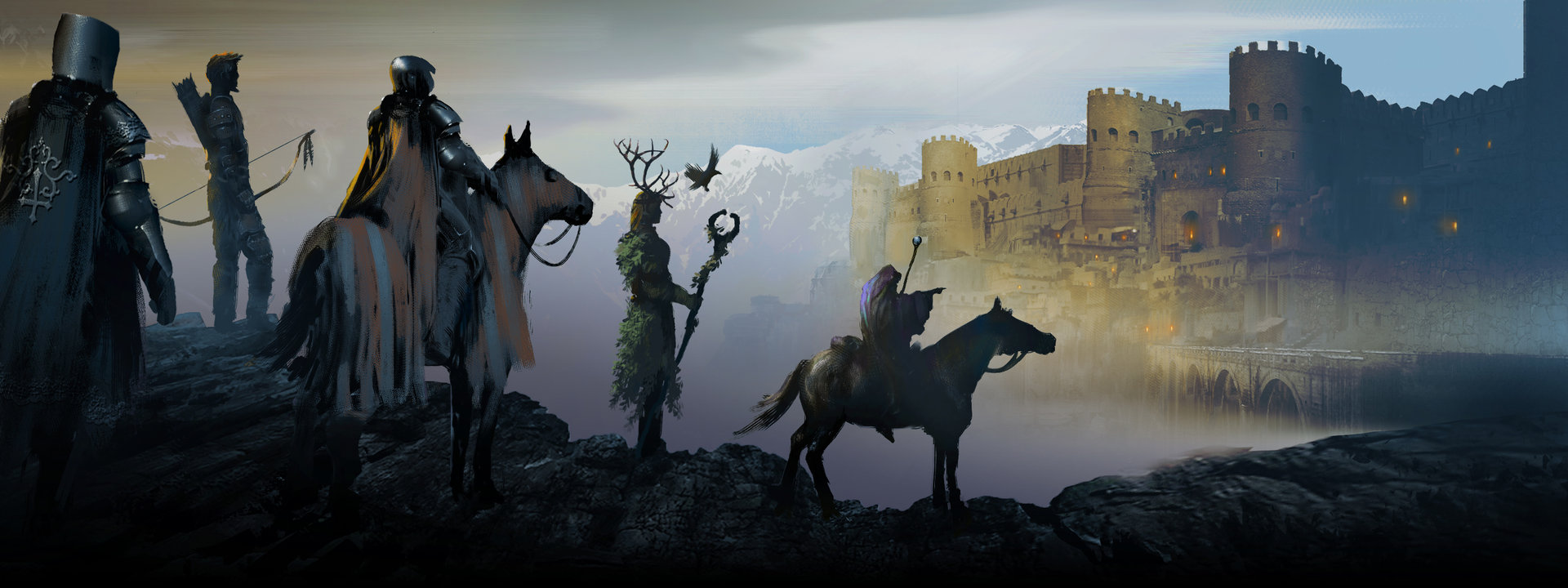
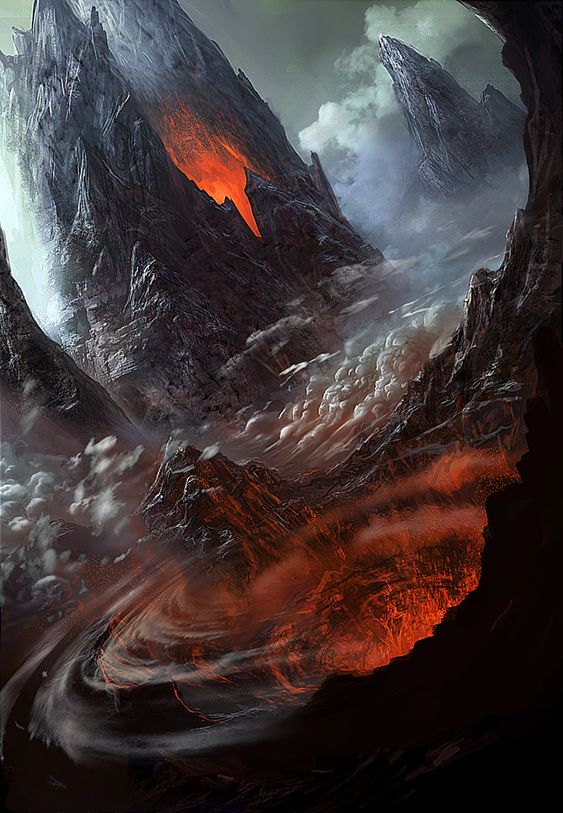
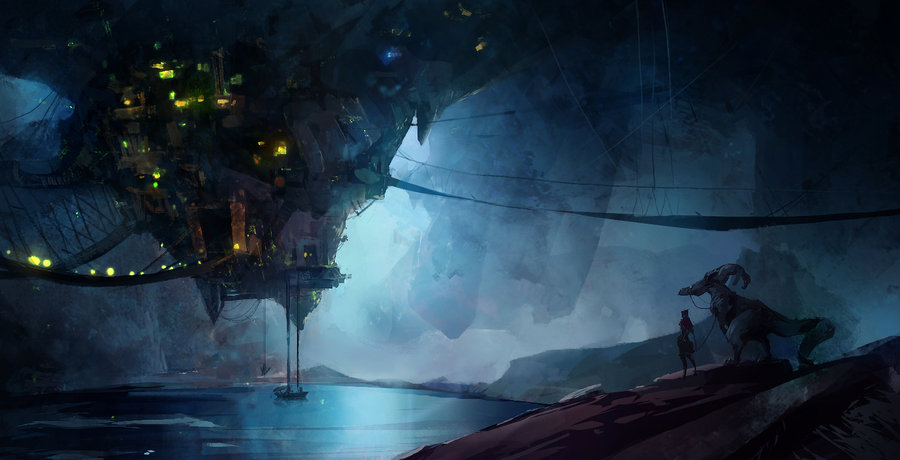
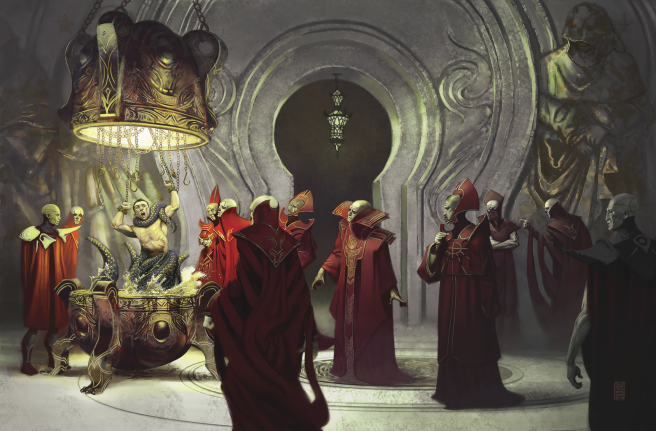
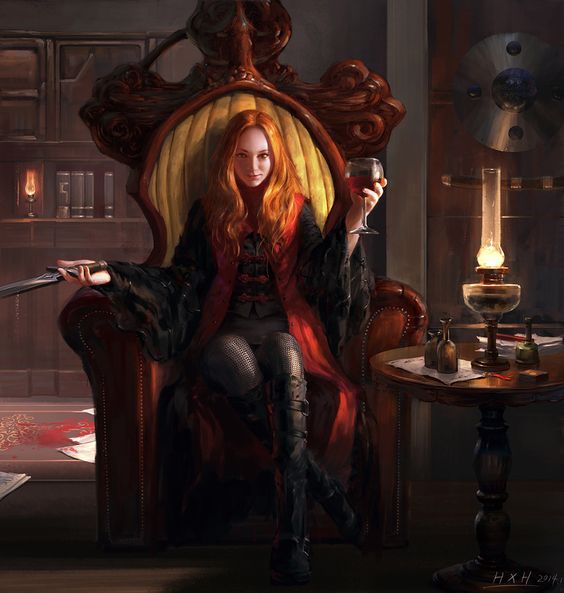
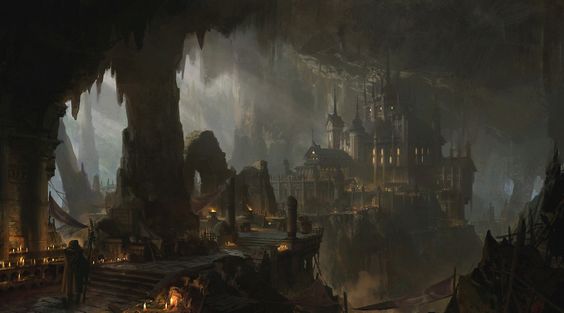
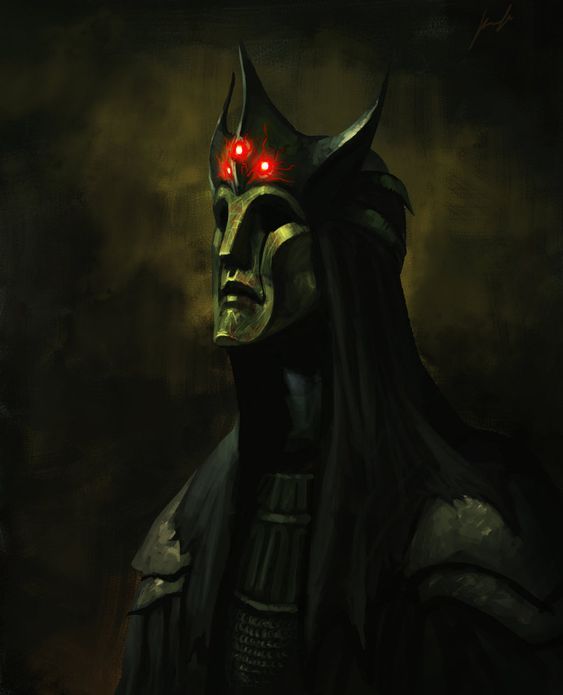
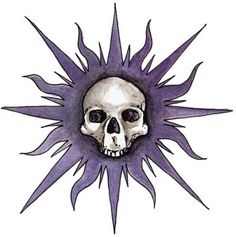


Comments